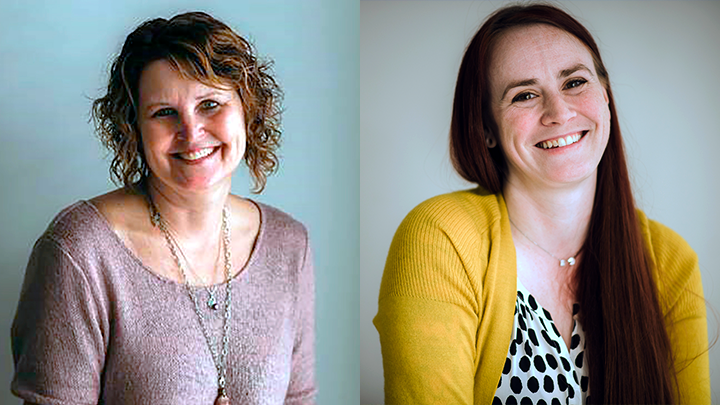
October 7, 2020

“Families go through recovery, too,” says Katherine Shettell, at left, Family Peer Support worker. “It’s great when I can connect them to the help and resources they need and they know there’s support for them and their young person struggling with mental health or addiction.” She’s shown here with Suzanne Cunningham, a Peer Support worker with Young Adult Services.
Story & Photo by Vanessa Gomez
Helping individuals to lead healthier, more meaningful lives by working with them to achieve their mental health and addictions goals is all in a day’s work for Family Peer Support and Peer Support workers with Alberta Health Services.
In fact, Addiction and Mental Health Services has been welcoming new additions to their team to continue providing the best care and support for those who seek help.
Established in 2015, the program’s Family and Peer Support workers are embedded within clinical teams where they work to connect individuals to community services such as housing, education and skill development. They also help with everyday tasks, such as getting out of the house, taking the bus and attending appointments — helping participants to build confidence as they achieve their goals.
“We started with a small number of Peer Support workers, but it has grown exponentially,” says Rebecca Rathwell, Care Manager, Recovery Supports.
There are now almost 30 peer support workers across Addiction and Mental Health in the Edmonton Zone. “They open a door for people to explore other services, and as teams have added peer support workers they begin to understand the critical role they play in the healthcare journey.”
Michelle Knox, Program Care Manager, Recovery Supports, adds: “For people who have experienced the mental health system, they can feel like they are just in a stream and it’s easy to get lost. To have someone come alongside you and say ‘It’s OK’ is so reassuring. It helps individuals achieve their goals without struggling so much.”
Peer Support workers bring a unique perspective to their clinical teams, with many having lived experience with mental health or addictions. Their counterparts, Family Peer Support workers, bring value by providing support to families who have loved ones living with mental health struggles or addictions.
“It can be difficult to see how clinicians are helping you, sometimes,” says Suzanne Cunningham, a Peer Support worker with Young Adult Services. Her work in the Peer Support program has largely been inspired by her own journey with mental health. “Connecting with individuals through shared experiences really breaks down any barriers and gives them hope that they can recover and lead healthy, meaningful lives.”
“Families go through recovery, too,” says Katherine Shettell, Family Peer Support worker. “It’s great when I can connect them to the help and resources they need and they know there’s support for them and their young person struggling with mental health or addiction.”
A large part of Cunningham’s and Shettell’s roles is being vulnerable themselves as they share their experiences in order to educate and help others.
“You have to be really intentional about what you share and be aware of things that are still sensitive,” adds Cunningham. “You can sometimes get trapped in that same emotional experience when you are constantly talking about it.”
“I have to be on top of my own wellness,” says Shettell. “Spending time with family and engaging with hobbies that take me away from work for a bit is so helpful. We also have a very supportive team who is open to hearing us out on tough days.”
Despite the challenge of revisiting the dark days and challenges of their past, Cunningham and Shettell say they find great meaning in their work and strive to be a source of courage, support and inspiration for those around them.
“It’s rewarding to be a witness to the progress that people make,” says Cunningham. “We’re walking beside them — and it’s amazing to see the hard work they’ve been putting into their journey — and their ability to recognize that progress in themselves.”